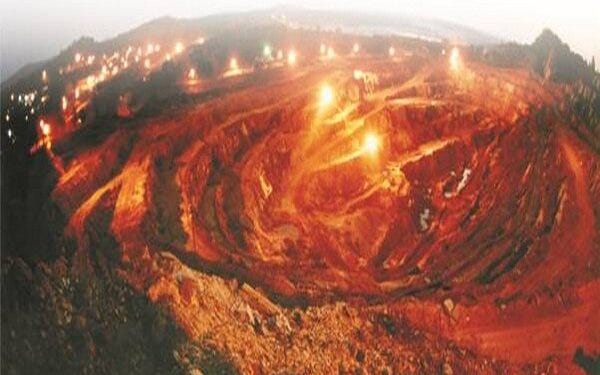China to Invest in Afghanistan's Lithium Sector in Bid to Control Country's Deposits
China-based Gochin Company has offered to invest USD 10 billion in Afghanistan's lithium mining industry, which is worth more than USD 1 trillion.
China-China-based Gochin Company has offered to invest USD 10 billion in Afghanistan's lithium mining industry, which is worth more than USD 1 trillion.
Khaama Press reports that the Chinese firm's offer appears to be part of a larger strategy to control Afghanistan's mineral resources, particularly its lithium deposits, which are crucial to global mineral supply chains.
If the company is awarded the lithium mining contract, it has also promised to engage in several other infrastructure projects in Afghanistan, such as tunnels, hydroelectric dams, and highways, according to the Afghanistan Ministry of Mines and Petroleum.
China has been looking to expand its economic presence in Afghanistan and gain control of its natural resources since the Taliban took over the country. According to Khaama Press, Chinese businesses and authorities have been in contact with Taliban leaders to renegotiate and restart prior mining and oil contracts.
On January 6, the Taliban signed an agreement with the Xinjiang Central Asia Petroleum and Gas Company (CAPEIC) to collect oil from the Amu Darya basin. China is set to invest USD 150 million in the deal's first year and USD 540 million over the next three years.
By expanding its presence in Afghanistan, China has the chance to increase its regional power and influence.
Sayed Mehdi Munadi, a French-based international affairs analyst and former Afghan diplomat stationed in Beijing, claims that China is also illegally exploiting Afghanistan's natural riches through bribery, smuggling, and other means. Recent allegations of the Taliban authorities detaining five persons, including two Chinese nationals, for reportedly attempting to smuggle an estimated 1,000 tonnes of lithium-bearing rocks out of the country through Pakistan support his assertion.
Senior Afghan Ministry of Mines and Petroleum official Mohammad Rasool Aqab claims that the rocks, which contained up to 30 per cent lithium, were stealthily removed from Nuristan and Kunar, two of the many Afghan regions bordering Pakistan.
China is rapidly increasing its demand for lithium and cobalt due to its sale of more than half of the world's electric automobiles. As per a report of Khaama Press, nearly two-thirds of the world's lithium is processed and refined by Chinese enterprises, which could pose a supply chain danger for other nations.
Chinese firms have made large investments in lithium mining in Latin America during the past five years, including Argentina, Bolivia, Mexico, and Chile.
Additionally, Chinese businesses are looking to Africa, including Zimbabwe, Namibia, and the Congo, for mineral assets. China is investing not just in home refineries but also in mines abroad to process the output.
Concern over access to essential minerals is at an all-time high after Russia's invasion of Ukraine and the rise in Western-China tensions. China is seeking to establish a monopolistic position in rare earth metals, cobalt, and other minerals essential for the transition to the new generation of energy sources.
Analysts note that Chinese firms invested in the supply of lithium in Latin America and Africa even when the price of lithium was low as part of their long-term plan to ensure the supply of rare earth elements.
David Deckelbaum, MD for Sustainability and Energy Transition at New York-based Cowen Inc., estimates that China has invested between USD 60 and USD 100 billion in building its lithium industry over the past ten years by subsidising the production of inexpensive electric vehicles and encouraging businesses to invest in infrastructure for mining and refining the metal.
For other nations looking to transition to green energy, the Chinese approach presents a geopolitical and security problem. Other countries may now need to lessen their reliance on the Chinese lithium supply and build a safe, independent supply of lithium before it is too late.
For other nations seeking to transition to green energy, the Chinese approach, driven by a long-term strategy to broaden its geoeconomic interests and secure market supremacy, poses significant geopolitical and security concerns.
In 2019, China threatened to withhold rare earth from the US as part of a trade dispute, highlighting the leverage it has over critical materials.
Despite not having the greatest lithium reserves in the world, China controls the world's lithium battery supply chain, accounting for 58% of the world's refining capacity, according to the International Energy Agency.
By 2025, mines under Chinese control are projected to increase lithium production from 194,000 tonnes in 2022 to 705,000 tonnes, as per UBS AG.
This could raise China's share of this essential mineral for electric vehicle batteries from 24% in 2021 to 32% of the global supply, as reported by Khaama Press.
Other nations may need to decrease their reliance on Chinese lithium supplies and establish a secure, independent supply chain for lithium before it is too late. However, doing so could increase supply chain risks for those countries.
The prospect of China dominating the lithium market, similar to OPEC's control of petroleum, is a serious concern, as per Khaama Press.



